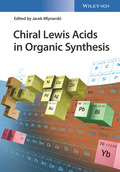Chiral Lewis Acids in Organic Synthesis

1. Edition August 2017
XIV, 381 Pages, Hardcover
100 Pictures
22 tables
Monograph
A complete overview covering the application of metal-based chiral Lewis acids from all parts of the periodic table, the Author emphasizes the most recent contributions to the field as well as prominent direction of development.
The book discusses the design of chiral complexes as well as a wide spectrum of reactions promoted by various chiral Lewis acids, including water-compatible acids as well as the most important applications in the chemical and pharmaceutical industries.
A must-have for catalytic and organic chemists working in the field, both in academia and industry, as well as pharmaceutical and medicinal chemists.
Alkaline Earth Metal-Based Chiral Lewis Acids (s-Block Lewis Acids)
Selected d-Block Metals (Ti, V, Cr, Mn, Fe, Co, Ni)
Zinc-Based Chiral Lewis Acids
Copper-Based Chiral Lewis Acids
p-Block Metal-Based Chiral Lewis Acids
Chiral Lanthanide Complexes (f-Block Lewis Acids)
Water Compatible Chiral Lewis Acids
Application of Chiral Lewis acids in Industry with the Focus on Asymmetric Reductions
Cooperative Application of Chiral Lewis Acids and Broensted Acids in Asymmetric Synthesis
Application of Chiral Lewis Acids in Solid Phase


